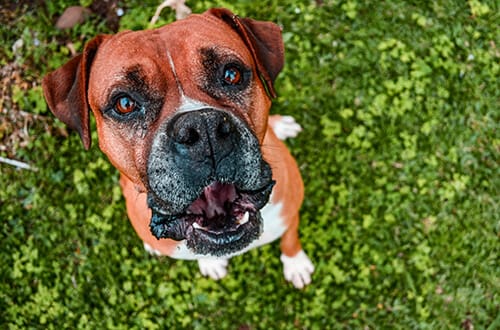Dilated cardiomyopathy, also known as DCM, is among the most common of acquired heart diseases in large or giant breed dogs. While it can develop in any dog, it’s more rare in medium or small dogs. Since some breeds are more likely to develop the disease, we know there is a genetic link to many cases, but the exact causes of DCM in our furry friends are not fully understood. There is evidence, though, that taurine deficiency or underactive thyroid can also contribute to DCM.
DCM cannot be cured, but it can be managed to improve both the quality and length of life. This makes it especially important for dog lovers to keep current on your pet’s wellness exams since veterinarians will typically be able to identify the sounds of irregularities in the heart earlier than owners will see more advanced, visible symptoms.
So what do you need to know about DCM and our four-legged family members? Let’s take a look!
 DCM is most common in adult or senior large and giant breeds, but there are a few exceptions, such as cocker spaniels. Interestingly, a genetic mutation responsible for causing DCM in dobermans and boxers has been discovered and can now be tested for. We hope that soon more breeds will have access to testing too!
DCM is most common in adult or senior large and giant breeds, but there are a few exceptions, such as cocker spaniels. Interestingly, a genetic mutation responsible for causing DCM in dobermans and boxers has been discovered and can now be tested for. We hope that soon more breeds will have access to testing too!
Some of the dogs most likely to develop DCM are:
DCM is characterized by dilation of the heart’s ventricles and thinning of the ventricle walls. This impairs the heart’s ability to pump blood effectively. Unless a veterinarian has listened to the heart for abnormalities, the secondary symptoms of this dilation—after time has advanced the condition—are usually what dog owners will notice at home. These signs include lethargy, shortness of breath, weakness, collapse, coughing, or distended abdomen.
Medications can improve and extend quality of life, giving you significantly more time with your furry family member than without any treatment. Treatments will be tailored to your individual pet based on health status. There are several drugs that can be used to address symptoms either individually or in combination, depending on what your pet needs. As with humans, there is no known cure for DCM, but efforts to manage the disease, especially from early onset, are definitely beneficial.
Are you concerned that your pup might have a heart condition? Our stethoscopes are ready. Let’s talk. (New client exams are just $1.)